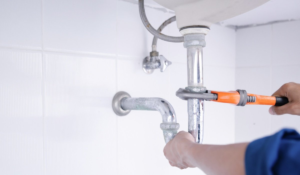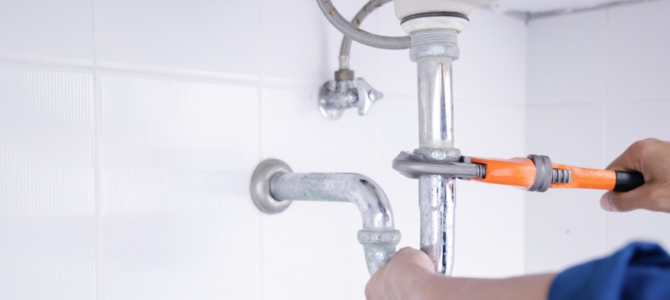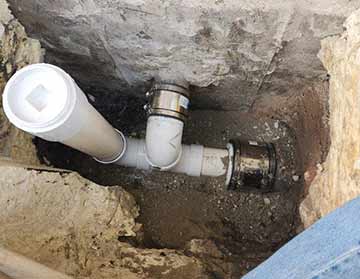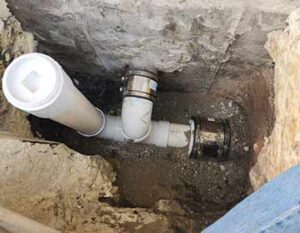Plumber is essential to the health and comfort of your home. It provides fresh water for drinking and cooking, removes wastewater, and keeps drain lines and sewer systems clear.
Residential plumbers are trained to inspect, install, and repair various water and drainage systems. They also provide routine inspections to prevent plumbing emergencies.

The plumbing system is one of the most important parts of any building. It delivers fresh water for drinking, cooking and washing as well as carrying away waste and sewage. A plumber can inspect the system and perform repairs to keep it functioning properly.
The basic components of a plumbing system are pipes, valves and fixtures. There are a number of types of pipes used in plumbing, including metal and plastic. Copper is a popular choice for plumbing systems because it is durable and provides good water pressure. However, it can corrode over time and may need to be replaced. PVC is a more modern pipe material that provides better water flow and resists corrosion.
There are several different kinds of valves used in plumbing, such as ball, butterfly and gate valves. Each type of valve serves a different purpose, but they all work to control water flow in the pipes. It is essential to know how these devices operate so you can make the right decisions about what kind of valves to use in your home.
Plumbing systems are typically divided into two subsystems: the potable water system and the sanitary sewer system. The potable water system brings water into a building for use and the sanitary sewer system takes waste water out of the building. A plumbing inspection can determine the condition of your pipes and fixtures and whether they are leaking or clogged.
Understanding how your plumbing system works can help you prevent issues from arising and identify when it is time to call a plumber. If you notice a leak or other problem, it is important to have it fixed as soon as possible to minimise damage and avoid expensive repairs.
Leaky faucets, running toilets and dripping showers can add up to big water bills and excessive water wastage. By regularly having your plumbing inspected, you can be proactive about identifying and fixing potential problems. Knowing the location of your main water shut off valve can also help you reduce stress in an emergency situation. By following these simple tips, you can keep your plumbing in good working order and save money on your energy bill.
Drains need to be cleaned on a regular basis to prevent the build-up of hair, soap residue, grease, and other debris. These materials can block the flow of water in your pipes, leading to slow-running or even completely clogged drains. While you can try to do the job yourself, it’s often best to leave this task to a professional plumber. They have the tools and experience necessary to clean your drains without causing any damage to your pipes, fixtures, or health.
Liquid drain cleaners work by creating a chemical reaction with the clog material and dissolving it. However, they’re often dangerous to use and can cause several problems when used improperly. They can be toxic to your body if they come into contact with skin or eyes, and they may also deform or weaken your pipes, especially those made of PVC. They can also be harmful to the environment since they often contain hazardous chemicals that can seep into groundwater and harm ecosystems.
There are many alternatives to liquid drain cleaners. For example, you can try using hot and cold water to clear a clogged drain. You can also pour baking soda and vinegar down the drain to create a chemical reaction that will dissolve the clog material. However, these methods don’t always work, and they can be ineffective if the clog is caused by a broken pipe or sewer backup.
Some people try to save money by using a drain snake, which can be purchased at most hardware stores. However, they’re often ineffective and can cause further damage to your pipes. In addition, they can be dangerous to use if you’re not familiar with how to operate them correctly.
For a more thorough drain cleaning, you can hire a professional plumber to use video pipe inspection technology. This tool sends a cable with a camera attached to the end into your plumbing system to view the inside of your pipes. This can help your plumber determine the location and nature of the clog, so they can take the appropriate measures to remove it. Before the plumber arrives, you should clear a path for them to work and remove any items that could get in their way.
Water heaters are the appliances that provide all the hot water for your sinks, showers and tubs. They’re usually located in the basement, garage or a utility closet. Standard tank water heaters use a dip tube to bring in cold water from the home’s plumbing pipes, and then they turn on the heating element until the hot water temperature reaches your set point. Then, the hot water exits the top of the tank and flows to your faucet.
Electricity, natural gas or propane are the most common fuel sources for residential water heaters. However, if you choose to go with a natural or propane gas unit, there must be an exterior venting system that must be installed by a professional plumber. Energy Star-qualified natural and propane gas tanks are currently available for households with typical water consumptions. These systems use a flue and baffle blowers to direct the exhaust gases outside the house.
Small point-of-use electric storage water heaters are sometimes used to supply hot water to fixtures located far from the main hot water heater, such as kitchen and bathroom sinks. These units use low power heating elements to maintain the hot water temperature thermostatically, and they consume significantly less energy than large tank heaters.
There are a few problems that occur in homes from time to time that call for the assistance of a home plumber. Although some of these issues have at-home solutions, it is better for homeowners to let a professional take a look and fix them as needed.
Plumbing repairs typically involve drain clearing or cleaning, leak detection and repair, sewer line cleanouts and more. Homeowners may not be able to tackle these issues on their own because of the complexity and difficulty involved in completing such tasks. Professionals have the experience and tools necessary to do such jobs quickly and efficiently.
Some of the most common plumbing repairs include clogged drains, toilets that continuously run water, and water pressure problems. These are a few of the most common problems that need to be fixed by a professional, but there are many others. Plumbers are trained to identify the source of the problem and come up with a solution that is best for the customer and the plumbing system as a whole.
One of the most important things a plumber can do is to ensure that the water in a house is safe and clean. This means that they will test for any contaminants in the water, such as toxins and heavy metals. The plumber will also ensure that there are no leaks in the plumbing system, which can cause major damage to a home and result in expensive repairs.
Leaks are a huge problem for homeowners because they can lead to water damage, mold, and mildew. They can also increase a homeowner’s water bill significantly, especially if they are located in areas such as the basement or kitchen. Professionals will use a variety of methods to repair leaks, including pipe repairs, replacement, and patching.
The plumbing system is an intricate network of pipes, fixtures and appliances that facilitate the distribution of water, gas and waste in residential and commercial buildings. Plumbers are responsible for the installation, maintenance and repair of these systems, ensuring that they provide safe and efficient water supply, gas distribution and drainage. In addition, they work to ensure that the water is of a high quality and prevent the infiltration of contaminants. They also educate people on the best practices for protecting and maintaining their plumbing systems.


